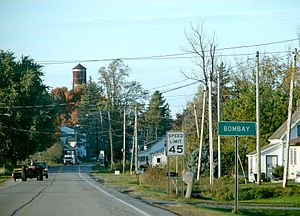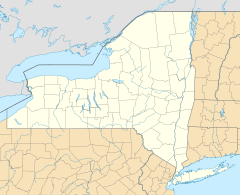Bombay, New York facts for kids
Quick facts for kids
Bombay, New York
|
|
|---|---|
 |
|
| Country | United States |
| State | New York |
| County | Franklin |
| Named for | Mumbai, India |
| Government | |
| • Type | Town Council |
| Area | |
| • Total | 35.87 sq mi (92.90 km2) |
| • Land | 35.74 sq mi (92.57 km2) |
| • Water | 0.13 sq mi (0.32 km2) |
| Elevation | 207 ft (63 m) |
| Population
(2010)
|
|
| • Total | 1,357 |
| • Estimate
(2016)
|
1,314 |
| • Density | 36.76/sq mi (14.19/km2) |
| Time zone | UTC-5 (Eastern (EST)) |
| • Summer (DST) | UTC-4 (EDT) |
| ZIP codes |
12914, 13655
|
| Area code(s) | 518 |
| FIPS code | 36-033-07278 |
| GNIS feature ID | 0978742 |
Bombay is a small town in Franklin County, New York, United States. In 2010, about 1,357 people lived there. The town got its name from a big port city in India, which is now called Mumbai. An early landowner, whose wife was from a place near Mumbai, chose the name.
Bombay is located in the northwestern part of Franklin County.
Contents
History of Bombay
How Bombay Got Its Name
The town of Bombay was named after the wife of Michael Hogan. He was an Irish ship captain who became very rich from trading goods with places in East India. In 1805, he came to the United States with his wife. Hogan used to say his wife was an Indian princess.
Michael Hogan bought a huge piece of land, about 20,000 acres (81 square kilometers), north of the Adirondack Mountains. This land included the area where the town of Bombay is now. He named the town to honor his wife's birthplace, which was near the city of Bombay in India.
Early Leaders and Growth
Michael Hogan's son, William Hogan, also played an important role in the town. He served as the town's supervisor, which is like a local leader. Later, he was elected to the New York State Assembly in 1822. In 1829, he became a judge for Franklin County. The next year, in 1830, he was elected to the U.S. Congress.
People started settling in the Bombay area around 1805. This region was part of a huge land deal known as Macomb's Purchase. This was when New York State first sold off lands that used to belong to the Iroquois people. The town of Bombay was officially created in 1833. It was formed from a part of the nearby town of Fort Covington.
Challenging Times
In 1877, the town faced a big problem. A large number of grasshoppers appeared and ate more than half of the crops in the fields. This was a very difficult time for the farmers and people living in Bombay.
Geography of Bombay
Where is Bombay Located?
Bombay is in the northwestern part of Franklin County, New York. It's about 5 miles (8 kilometers) south of the border between Canada and the United States.
The town has several neighbors:
- To the northwest is the St. Regis Mohawk Reservation.
- To the northeast and east is the town of Fort Covington.
- To the southeast is Bangor.
- To the south is Moira.
- To the west is the town of Brasher, which is in St. Lawrence County.
Land and Water
The total area of Bombay is about 35.87 square miles (92.9 square kilometers). Most of this is land, about 35.74 square miles (92.6 square kilometers). A small part, about 0.13 square miles (0.3 square kilometers), is water.
Two important rivers flow through or near Bombay:
- The St. Regis River forms the northwestern border of the town. It eventually flows into the St. Lawrence River.
- The Little Salmon River winds its way from the south to the north through the middle of Bombay.
Roads and Highways
Several main roads help people travel through Bombay:
- New York State Route 95 goes north and south. It connects New York State Route 37 in the north to U.S. Route 11 in the town of Moira in the south.
- New York State Route 37 is an east-west highway. It passes through Bombay and the Mohawk Reservation, leading west to Massena and east to Fort Covington.
- New York State Route 37C meets NY-37 in Hogansburg, which is in the northwestern part of Bombay. From there, it goes south to Helena.
People of Bombay (Demographics)
| Historical population | |||
|---|---|---|---|
| Census | Pop. | %± | |
| 1840 | 1,446 | — | |
| 1850 | 1,963 | 35.8% | |
| 1860 | 2,440 | 24.3% | |
| 1870 | 1,488 | −39.0% | |
| 1880 | 1,044 | −29.8% | |
| 1890 | 1,496 | 43.3% | |
| 1900 | 1,489 | −0.5% | |
| 1910 | 1,339 | −10.1% | |
| 1920 | 1,251 | −6.6% | |
| 1930 | 1,216 | −2.8% | |
| 1940 | 1,140 | −6.2% | |
| 1950 | 1,102 | −3.3% | |
| 1960 | 1,103 | 0.1% | |
| 1970 | 1,117 | 1.3% | |
| 1980 | 1,247 | 11.6% | |
| 1990 | 1,158 | −7.1% | |
| 2000 | 1,192 | 2.9% | |
| 2010 | 1,357 | 13.8% | |
| 2016 (est.) | 1,314 | −3.2% | |
| U.S. Decennial Census | |||
According to the census from 2000, there were 1,192 people living in Bombay. These people lived in 483 households, and 327 of these were families. The population density was about 33.3 people per square mile (12.9 people per square kilometer).
About 33.1% of the households had children under 18 living with them. Around 48.0% of households were married couples living together. The average household had about 2.47 people, and the average family had about 2.97 people.
The population was spread out by age:
- 27.6% were under 18 years old.
- 12.6% were 65 years old or older.
The average age of people in the town was 37 years.
Communities and Locations in Bombay
- Bombay – This is the main hamlet (a small village) in the center of the town. It is located on NY-95, close to where County Roads 1 and 4 meet.
- Hogansburg – This hamlet is in the northwestern part of the town. It's on NY-37, right by the St. Regis River. It used to be called "St. Regis Mills" or "Grays Mills."
- Pike Creek – This is a stream that flows north towards the St. Lawrence River.
- South Bombay – This hamlet is located near the southern border of the town, on County Road 32.
See also
 In Spanish: Bombay (Nueva York) para niños
In Spanish: Bombay (Nueva York) para niños


